科普版六年级下册英语第一课单元复习
科普版-英语-六下-科普版六下大复习一

六年级大复习一(人称代词.Be动词.称呼.日期.四季.十二月份.方位词反义词)1.人称代词你是you我是I男他he 女她she 物它it他们they 我们we2.BE 动词I用am you 用areis用于他她它复数人称都用are3.称呼爷爷外公grandpa奶奶外婆grandma父亲父亲是father母亲母亲是mother哥哥弟弟brother姐姐妹妹sister叔叔舅舅是uncle姑姑阿姨是aunt.4.日期Year –year是年,月是month,天是day,Week-- week是星期Time-- time 是时间小时小时是hour,Hour---hour---,分钟分钟minute,Minute—minute---秒钟秒钟second,Second—second---。
5.四季春天春天spring,夏天夏天summer,秋天秋天autumn,冬天冬天winter。
6.十二月份一月梅花香又香一月一月January January---- January----;二月兰花盆里装,二月二月February; February----February----三月桃花红十里,三月三月March;March----March----四月蔷薇靠短墙,四月四月April April—April---;五月石榴红似火五月五月MayMay---May ---;六月荷花满池塘,六月六月JuneJune -- June---七月July –July ---July --- ;八月桂花满树黄八月八月August August ---August----;九月菊花初开放;九月九月September September---September---十月芙蓉正上妆十月十月October October—October---;十一月水仙供上岸;十一月十一月November十二月腊梅雪里香十二月十二月December ;7.方位词上是up下是down左是left右是right前是front后是back东是east西是west南是south北north外面out里面in8.反义词大的big小的small,长的long短的short,高的tall 矮的short胖的fat瘦的thin近的near,远的far旧的old --新的new年老的old年轻的young,漂亮的pretty丑陋的ugly好的good坏的bad正确的right --错误的wrong安全的safe --危险的dangerous 开始begin 结束end快的fast慢的slow黑色的black白色的white忙的busy闲的free,便宜的cheap昂贵的dear干净的clean肮脏的dirty聪明的clever 愚蠢的foolish晴朗的sunny 多云的cloudy热的hot冷的cold湿的wet干的dry温暖的warm凉爽的cool空的empty满的full早early晚late来是come去是go夜晚night白天day最初的first最后的last开心的happy伤心的sad软的soft硬的hard这儿是here 那儿there 假期holiday工作日weekday相同的same --不同的different 生病的ill--健康的well笑是laugh哭cryleave离开--到达arrive轻light --重heavy许多many --很少few丢失lose --找到find下一个next上一个last move 移动-- stop 停打开pen–关闭close富有的rich贫穷的poor teach 教-- learn 学乡村country城镇town。
小学科普版英语(第8册——六年级下册)1-12课课文和知识点

第一课Who runs fastest in your class? Let’s talkA: Look at the three runners.Who is the one in the middle?B: He’s John.A: Is he the tallest boy in your class?B: No, he isn’t.A: Who is the tallest boy in your class? B: Lin Hai.A: Who runs fastest in your class?B: Liu Wei runs fastest.A: Which one is Liu Wei?B: Look! The one in the yellow T-shirt.Let’s learnA:Who jumps highest, Tom, Jim or Jack? B:Jack jumps highest of the three.A: Who runs fastest, Mary Lucy or Lily?B: Lily runs fastest of the three.A: Who is the fattest, Ted, Tim or Dick.B: Ted is the fattest of the three.A: Who is the oldest, Kate, Jane or Eve.B: Eve is the oldest of the three.Read1.A little cat is talking with his mother.2.He thinks cats are the strongest and biggest animals in theworld.3.Don’t say that in front of an elephant.4.He goes out to look for the elephant.5.On his way, he first meets a little monkey.6.An elephant is much bigger than me.7.An elephant is much stronger than me.8.go on继续9.climb up爬10.Get down!下来11.talk with和某人说话,谈论12.in front of在……之前13.go out出去14.look for寻找15.on one’s way在路上第二课I t’s on the fifth floor. Let’s talkWhere is the reading room.Is it on the third floor?No, it’s on the fifth floor.She’s in her classroom.What class is she in?She’s in Class 3, Grade 6.Let’s learn序数词:1.第一first 2.第二second 3.第三third4.第四fourth5.第五fifth6.第六sixth7.第七seventh 8第八eighth 9.第九ninth10.第十tenth 11.第十二eleventh12.第十二twelfthA: Where is the teachers’ office?B: I t’s on the third floor.A: Where is Class 1, Grade 2?B: It’s on the first floor.A: Where is Class 5, Grade 3?B: It’s on the second floor.A: Where is the lab?B: It’s on the fourth floor.Read for fun1.Where is the sixth donkey?2.A man is walking along a road with his six donkeys.3.get on上车,骑上4.some time一段时间5.He goes back to look for the sixth donkey.6.A friend of his comes up.7.You are sitting on the sixth donkey.8.sit on坐在……上9.go on 继续,发生e up走过来ugh at嘲笑第三课It will be cold tomorrow.Let’s talkWhat’s the weather like tomorrow?It will be cold tomorrow.It’s fun to walk in snow.I don’t like winter at all.Let’s learnA: What’s the weather like tomorrow? B: It will be sunny.A: What’s the weather like tomorrow? B: It will be windy.A: What’s the weather like tomorrow? B: It will be rainy.A: What’s the weather like tomorrow? B: It will be hot.A: What’s the weather like tomorrow? B: It will be cold.A: What’s the weather like tomorrow?B: It will be cloudy.A: What’s the weather like tomorrow?B: It will be cool.A: What’s the weather like tomorrow?B: It will rain.Read1.Christ Child圣婴e around发生3.The water of the sea near Peru will become warmer.4.A strong will blow to many places in the world.5.The wind will bring heavy rain to some places.6.bring about引起7.In 1998 big floods hit South China.8.full of充满Ask and answer-What’s the weather like today?-It’s fine.-What’s the weather like tomorrow?-It will rain.第四课What will you do when you grow up? Let’s talkWhat will you do when you grow up?I’ll be a doctor.Read1.When I grow up, I will be a worker.2.I will build a big house for my parents.3.I’ll grow rice and wheat for the people.4.I will teach students to read and write.5.I’ll drive a large bus for the people.6.I will sing songs for the people.7.I’ll fly my plane all the way to the stars.8.I’ll still come home to see my mama.9.–What will Tom do when he grows up?10. –He will be a worker.11.grow up长大,成长12. grow rice种水稻e home回家14.fly a plane驾驶飞机第五课What will you do tomorrow? Let’s talkWhat is tomorrow’s date?It’s March 12th ,Tree Planting Day. What do you do on Tree Planting Day? We plant trees.Where will you plant trees tomorrow? What time will we go?Let’s learn-What’s the date tomorrow?-It’s March 12th, Tree Planting Day.-What will you do?-I will plant trees.-What’s the date tomorrow?-It’s March 15th.-What will you do?-I’ll grow roses.-What’s the date tomorrow?-It’s March 18th.-What will you do?-I will grow Chinese roses.-What’s the date tomorrow?-It’s April 8th.-What will you do?-I’ll plant willows.-What’s the date tomorrow?-It’s May 25th.-What will you do?-I will plant pines.Read1.They will plant many trees today.2.Plants are very important to people.3.Without plants life will not go on.4.They can keep the water from flowing away.5.blow up吹起6.flow away流失7.cut down砍断8.bring about引起9.do one’s best尽最大努力10.more and more越来越11.They will plant more trees and grow more plants.12.They will do their best to protect trees.13. Our country will be more beautiful.第六课 A trip around the worldRead1.summer holiday 暑假2.My parents and I are going to take a trip around the world.3.Big Ben大本钟4.the Great wall长城e to an end结束6.get ready for为…做好准备7.We’re going to stay in Paris for three days.8.Russia is the largest country in the world.9.We’ll go to Moscow by plane.10.China is one of the largest countries in the world.11.We’re going to climb the Great Wall in Beijing.12.My holiday will come to an end.13.We’ll fly back to Canada.14.I’ll get ready for the new term.第七课Let’s talkwhat’s the date today?It’s June 2nd.It was June 1st yesterday.Was it Children’s Day?Yes, it was. No, it wasn’t. Were you at school yesterday? Yes, we were. No, we weren’t. What did you do?We had a sports meeting yesterday.Let’s learnWhat was the date yesterday?It was Children’s D ay.What was the date yesterday?It was Teachers’ Day.What was the date yesterday?It was National Day.Read1.Fools’ Day愚人节2.You succeed in tricking someone.3.April Fool四月傻瓜4.I hear we’ll have an English test this morning.5.Mike told Mary about an English test.ugh at嘲笑7.write out 写出8.What’s the matter with you?9.I didn’t know the test at all.10.I wanted to play a joke on you.11.Mike played a joke on himself.12.What was the date yesterday?It was May 11th.13.an English test英语考试e in进来15.play a joke on sb和某人开玩笑16.第七课动词的过去式:(1)am / is(过去式)was (2)are(过去式)were(3)do(过去式)did (4)have(过去式)had(5)tell(过去式)told (6)review(过去式)reviewed(7)laugh (过去式)laughed (8)come(过去式)came(9)can(过去式) could (10)surprise(过去式)surprised (11)want(过去式)wanted (12)play(过去式)played第八课When were you born?Let’s talk1.the same age同岁2.When were you born?I was born in October, 1992.3.You are older than me.Read1.Your father is a month older than you.2.I had my birthday a few days ago.3.Did you have a good time on your birthday?4.My mother bought me four birthday cakes.5.I was born on February 29th.6.Every four years.每四年7.When was your father born?8.He was born in April.9.a few days ago几天前10.第八课动词的过去式:11.buy(过去式)bought第九课Did you play basketball last Sunday? Let’s talkHello, Tom! What do you often do on Sunday afternoon?I often play basketball.Did you play basketball last Sunday?No, I didn’t. I visited a friend.Did you have a good time?Yes, I did. My friend likes keeping birds. She showed me different kinds of birds. Did you like the bird?Yes, I liked them very much.Let’s learn-Were you at home yesterday?-Yes, I was.-Were you at school yesterday morning?-No, I wasn’t.--Did you watch TV yesterday?-Yes, I watched TV in the evening.-Did you wash clothes yesterday afternoon? -Yes, I washed clothes yesterday afternoon.Read1.How beautiful the birds are?2.There were no birds.3.in the garden在花园4.He didn’t catch the birds any more.5.not … any more不再6.be afraid of害怕7.fly away飞走Ask and answerDid you go to the cinema last night?Yes, I did. No, I didn’t.Did you like the film?Yes, I liked it.8.第九课动词的过去式:(1)visit(过去式)visited (2)show(过去式)showed (3)like(过去式)liked (4)wash(过去式)washed (5)watch(过去式)watched (6)live(过去式)lived(7)love (过去式)loved (8)walk(过去式)walked (9)say(过去式)said (9)try(过去式)tried (11)fly(过去式)flew (12)hop(过去式)hopped第十课Did you go to the park last Sunday? Let’s talkWhat did you do last Sunday?I went to the zoo.Do you often go there on Sunday?I sometimes go to the Northeast Tiger Garden with Dong dong.Did you see the tigers clearly?Our country is doing her best to protect them.Let’s learn-Did you go to the bookshop yesterday?-Yes, I bought a book about monkeys.-Did you read books yesterday evening.-Yes, I read a book about rare birds.-Did you take some photos last Sunday?-Yes, I took some photos of pandas.A gameI hear you watched TV yesterday evening.Oh, no. Not me. I did my lessons.Read1.I was driving along a road in Australia when the cars beforeme stopped.2.There were about ten cars in front of mine.3.I saw a koala mother with her baby on her back.4.in the middle在中间5.some time一段时间6.–What did Rob do yesterday?–He went boating.7.第十课动词的过去式:(1)go(过去式)went (2)jump(过去式)jumped(3)read(过去式)read (4)take(过去式)took(5)get(过去式)got (6)wonder(过去式)wondered(7)walk (过去式)walked (8)see(过去式)saw(9)sit(过去式)sat (10)start(过去式)started第十一课What did you do last Sunday?Let’s talkWhat did you do last Sunday?I went to the zoo.Who took you there?My parents.How did you go there?We went by bus.What animals did you see?We saw monkeys, pandas, elephants and many other animalsDid you have a good time?Yes, we did.Let’s learn-What did you do last Sunday?-I went to the park.-What did you do last Sunday?-I saw a film.-What did you do last Sunday?-I watched TV.-What did you do last Sunday?-I made a kite.-What did you do last Sunday?-I did my homework.Read1.Once there was a man in a village.2.His wife told him to buy an umbrella.3.Buy an umbrella for me, please.4.What a heavy rain!5.第十一课动词的过去式:(1)take(过去式)took (2)make(过去式)made(3)call(过去式)called (4)begin(过去式)began(5)run(过去式)ran第十二课Read1.Zeng Jinlian was the tallest woman in the world.2.The blue whale is the biggest animal in the world now.3.第十二课动词的过去式:(1)die(过去式)died (2)eat (过去式)ate动词过去式总表(1)am / is(过去式)was (2)are(过去式)were (3)do(过去式)did (4)have(过去式)had (5)tell(过去式)told (6)come(过去式)came (7)can(过去式) could (8)buy(过去式)bought (9)say(过去式)said (10)fly(过去式)flew (11)go(过去式)went (12)read(过去式)read (13)take(过去式)took (14)get(过去式)got (15)see(过去式)saw (16)sit(过去式)sat (17)make(过去式)made (18)begin(过去式)began (19)run(过去式)ran (20)eat (过去式)ate1.一般情况直接加-ed.(1)review(过去式)reviewed (2)laugh (过去式)laughed (3)want(过去式)wanted (4)play(过去式)played (5)visit(过去式)visited (6)show(过去式)showed (7)wash(过去式)washed (8)watch(过去式)watched(9)walk(过去式)walked (10)jump(过去式)jumped (11)wonder(过去式)wondered (12)start(过去式)started (13)call(过去式)called (14)talk(过去式)talked (15)look(过去式)looked (16)stay(过去式)stayed (17)climb(过去式)climbed (18)open(过去式)open2.以e结尾的动词加-d.(1)surprise(过去式)surprised (2)like(过去式)liked(3)live(过去式)lived (4)love (过去式)loved (5)die(过去式)died (6)believe(过去式)believed (7)use(过去式)used (8)move(过去式)moved 3.双写加-ed.(1)hop(过去式)hopped (2)stop(过去式)stopped 4.以辅音字母+y结尾的动词,把y变i,再加-ed.(1) try(过去式)tried (2) cry(过去式)cried (3) carry(过去式)carried。
小学英语各册知识梳理-六年级下册 科普版
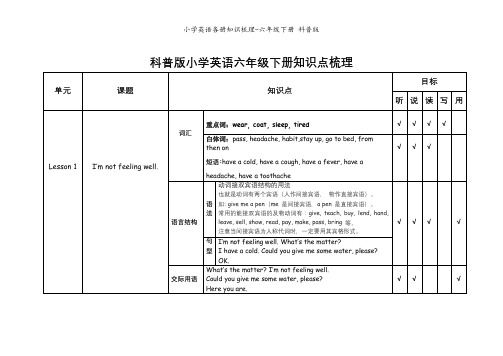
1)一般情况下,在动词原形后直接加-ed。如:wanted, played。
2)以不发音的字母e结尾的动词,直接加-d。如:hoped, lived。
3)重读闭音节单词需双写最后一个辅音字母,再加-ed。如:stopped, shipped。
4)以辅音字母+y结尾的动词变y为i,再加-ed。如:studied, worried。
√
√
√
语言结构
语法
一般过去时态的特殊疑问句
√
√
√
√
句型
What did you do last Saturday?
I saw a film.
交际用语
Who took you there?
How did you go there?
My uncle bought me a red sweater.
It looks nice on you.
I have a cold. Could you give me some water, please?
OK.
交际用语
What’s the matter? I’m not feeling well.
Could you give me some water, please?
Here you are.
√
科普版小学英语六年级下册知识点梳理
单元
课题
知识点
目标
听
说
读
写
用
Lesson 1
I’m not feeling well.
词汇
重点词:wear, coat, sleep, tired
√
√
√
√
白体词:pass, headache, habit,stay up, go to bed, from then on
【教材知识点梳理】小学英语各册知识梳理-六年级下册科普版
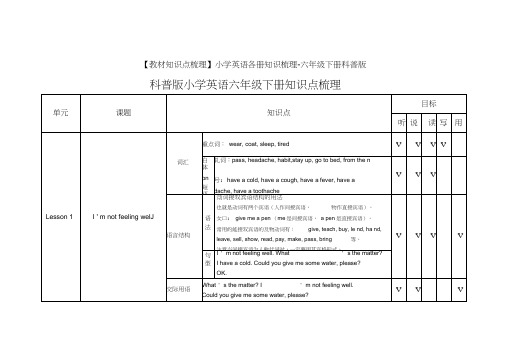
V
V
V
2) 以不发音的字母e结尾的单词,去掉e,再加-ing,女口:ride-riding, come-coming
3)以重读闭音节结尾、呈现辅一兀一辅 结构的单词,先双与
末尾的辅音字母,再力口-ing,女口:swim-swimming, sit-sitting
交际用语
Look! There they are.
V
V
V
Lesson 3
Did you go boati ng last
Sunday?
词汇
重点词:boat, zoo
V
V
V
V
白体词:last, life, protect, mine, middle, off,world
短语:have a good look at, do one's best, wait for, in the
常用的能接双宾语的及物动词有:give, teach, buy, le nd, ha nd,
leave, sell, show, read, pay, make, pass, bring等。
注意当间接宾语为人称代词时,一定要用其宾格形式。
V
V
V
V
句 型
I'm not feeling well. What's the matter?
V
V
V
语言结构
语
法
继续学习一般过去时态的一般疑问句形式及肯定否定回答
句 型
Did you stay at home last Sun day?
No, I went to the zoo.
V
V
V
V
交际用语
科普版六年级下册Lesson 1

Read
ANSWER THE QUESTIONS
1.Whose birthday is it today? 2.What’s the weather like today? 3.What is Mary doing now? 4.Is Mary’s mother going to make a cake
你将要举办一个生日聚会吗?
♠ —Are you going to ask Eve to come?
你将要邀请伊芙来吗?
♠ —Yes, I am. / No, I’m not.
是的,我会。 不,我不会。
* Is she going to make a cake? 她将要做一个蛋糕吗? * Are you going to have dinner? 你将要吃晚饭吗? * Are they going to sleep? 他们将要睡觉吗?
Revision
星期三
三十
星期二
星期日
五十 星期四
星期一 二十
Let’s talk
L: What day is it today? 今天星期几?
T: It’s Wednesday.
星期三。
L: My birthday is coming. 我的生日要到了。 T: When is your birthday? 你的生日是什么时候?
♠ 一般疑问句及回答 —Are you going to have a birthday party? —Yes, I am. / No, I’m not.
♠ 现在进行时表将来 My birthday is coming.
♠ Would ... like to表想要做某事 —Would you like to come? —Yes, I’d love/like to. / No, thanks.
六年级下册英语科普版单词表第一课

六年级下册英语科普版单词表第一课全文共3篇示例,供读者参考六年级下册英语单词六年级下册英语科普版单词表第一课1unit 1younger 更年轻的older 更年长的taller 更高的shorter 更矮的longer 更长的thinner 更瘦的heavier 更重的bigger 更大的smaller 更小的stronger 更强壮的dinosaur 恐龙hall 大厅metre 米than 比both 两个都kilogram 千克countryside 乡村lower 更低地shadow 影子smarter 更聪明的become 变成unit 2cleaned 打扫stayed 待washed 洗watched 看had 得病had a cold 感冒slept 睡觉read 读saw 看last 最近yesterday 昨天before 在……之前drank 喝show 演出magazine 杂志better 更好的faster 更快的hotel 旅馆fixed 修理broken 破损的lamp 台灯loud 大声的enjoy 享受……的乐趣stay 暂住unit 3went 去camp 野营went camping 去野营fish 钓鱼went fishing 去钓鱼rode 骑hurt 受伤ate 吃took 拍照took pictures 照相bought 买gift 礼物fell 摔倒off 落下labour day 劳动节mule 骡子turpan 吐鲁番could 能till 直到beach 沙滩basket 篮子part 角色licked 舔laughed 笑unit 4dining hall 饭厅grass 草坪gym 体育馆ago 以前cycling 骑自行车运动go cycling 去骑自行车ice-skate 滑冰badminton 羽毛球运动star 星easy 容易的look up 查阅internet 互联网different 不同的active 活跃的race 赛跑nothing 没有什么thought 想felt 感觉cheetah 猎豹trip 绊倒woke 醒dream 梦六年级下册英语科普版单词表第一课2颜色类colour 颜色;red 红色;yellow 黄色;white 白色;pink 粉红色;purple 紫色;brown 棕色;blue 蓝色;black 黑色;green 绿色;orange 橘红色、橙色数字类one 1;two 2;three 3;four 4;five 5;six 6;seven 7;eight 8;nine 9;ten 10;leven 11;twelve 12;thirteen 13;fourteen 14;fifteen 15;sixteen 16;seventeen 17;eighteen 18;nineteen 19;twenty 20;twenty-one 21;thirty 30;forty 40;fifty 50;sixty 60;seventy 70;eighty 80;ninety 90课程类chinese 语文;english 英语;p. e. 体育;math 数学;music 音乐;art 美术;science 科学天气类weather 天气;rainy 下雨的;sunny 晴朗的;snowy 下雪的;windy 刮风的;cloudy 多云的;warm 温暖的;cold寒冷的;cool 凉爽的;hot 炎热的动物类rabbit 兔子;cat 猫;dog 狗;duck 鸭子;pig 猪;panda 熊猫;bird 鸟;hen 母鸡;cow 奶牛;lamb 羊羔;goat 山羊;sheep 绵羊;horse 马;bear 熊;giraffe 长颈鹿;kangaroo 袋鼠;lion 狮子;tiger 老虎;deer 鹿;squirrel 松鼠;snake 蛇;whale 鲸;fish 鱼;mouse 老鼠;elephant 大象水果类apple 苹果;pear 梨;orange 橘子;banana 香蕉;grapes 葡萄;watermelon 西瓜;strawberry 草莓食物类fish 鱼;beef 牛肉;chicken 鸡肉;rice 米饭;noodles 面条;tofu 豆腐;tomato 西红柿;potato 土豆;cucumber 黄瓜;carrot 萝卜;eggplant 茄子;bread 面包;egg蛋;green beans 青豆;onion 洋葱;tea 茶;milk 牛奶;coffee 咖啡;coke 可乐;juice 果汁味道类tasty 可口的;yummy 好吃的;sour 酸的;sweet 甜的;salty 咸的;fresh 新鲜的;healthy 健康的服装类pants 长裤;jeans 牛仔裤;socks短袜;shoes 鞋子;t-shirt t恤衫;shorts 短裤;dress 连衣裙;boots 靴子; shirt 衬衫;skirt 裙子;jacket夹克衫时间o’clock …点钟; in the morning 在早上;in the afternoon 在下午;in the evening 在晚上;at noon 在中午; tomorrow 明天; yesterday 昨天;today 今天;this morning 今天早上;this evening 今天晚上;this afternoon 今天下午;next weekend 下周末;next week 下周; this weekend 这个周末;on the weekend 在周末;sually 通常;often 经常;sometimes 有时候;tonight 今晚;never 从不地点library 图书馆;school 学校;pet shop 宠物商店;park 公园;post office 邮局;cinema 电影院;bookstore 书店;hospital 医院;science museum 科学博物馆;bank银行;supermarket 超市;shoe store 鞋店;garden 花园方位词in 在…里面;on 在…上面;under 在…下面;behind 在…后面;in front of 在……前面over 在…上面(悬空);near 在…附近;turn left 向左转;turn right 向右转;next to 与…相邻;west 西;east 东;north 北;south 南;on the left 在左边;on the right 在右边;comic book 漫画书;newspaper 报纸;magazine 杂志;post card 明信片;dictionary 字典;living room客厅;study书房;kitchen 厨房;bathroom 浴室;bedroom 卧室;classroom 教室家具类mirror 镜子;end table 床头柜;closet 衣柜;curtain 窗帘;bed 床;trash bin 垃圾桶;chair 椅子;desk 桌子;window 窗户;table 台桌;phone 电话;sofa 沙发;door 门;floor 地板;wall 墙描述人物的形容词strong 强壮的;thin 瘦的;tall 高的;short 短的,矮的; big 大的;small 小的;long 长的;young 年轻的;old 老的;active 积极的;heavy 重的;cool 酷的;smart 聪明;kind 和蔼可亲的;strict严格的;quiet 安静的;funny 滑稽可笑的;fat胖的星期类mon. 星期一;tue. 星期二;wed. 星期三;thu. 星期四;fri. 星期五;saturday 星期六;sunday 星期天;day 天六年级下册英语科普版单词表第一课3unit 9可能是吵杂的拥挤的安静的山;山脉仅仅;刚好莫斯科俄罗斯柏林长城人口百万这是什么国旗?这是中国国旗。
科普版六年级下册英语第一课单元复习 ppt

指人,动植物等有生命的东西,主要用tall ,不用 high,
eg: a tall woman 一个高个子妇女
a tall horse 一匹高大的马
high /hai/ adj/adv高的、高地
low /ləʊ/ adj/adv低的、低地
high 反 义 词 low
adj.指建筑物、山时tall或high都可以,不过high的 程度比tall高。
-
6
• want to 想,想要 • go out 出去 • look for 寻找 • go on 继续 • climb up爬上 • get down下来
-
7
• 表时间 • • 表穿戴 • • 表地点 • • 表方位 •
in 用法小结
in the morning in the year in the yellow T-shirt. in his new clothes in the class in the world in the middle in front of
-
13
最高级的句子
• Who jumps highest, Tom, Jim or Jack? (Tom, Jim Jack,谁跳得最高?)
• Jack jumps highest of the three. (Jack是他们三个人当中跳得最高的。)
• Who runs fastest, Mary, Lucy or Lily? (Mary, Lucy, Lily,谁跑得最快?)
-
11
两类易考的最高级句型
• 类型一:
• 问:Who + 实义动词单三 + 最高级, A, B or C? 表示“谁做的最……的”。
小学英语六年级下册第一单元知识点总结
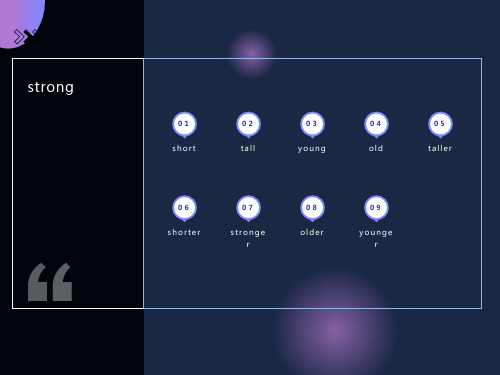
How are you?
How old are you?
I’m 9 years old.
I’m 164 cm tall.
How tall are you? 句式:主语+be动词+数字+长度单位+tall
百位数的读法
238
three hundred and ten
多重
询问重量
How heavy are you?
how old
多大
询问年龄
How old are you?
how long
多长
询问身体部位的长度
How long is your leg?
how big
多大
询问身体部位的大小
How big are your hands?
巧用how问体貌
动词line意为“沿….形成行(或列、排)”, line up是固定短语,意味“排队”
Line up from shorter to taller!
from… to…意为“从…到…”,起连接作用
How tall am I ? 我多高? 句式: How tall + be动词+主语?
形容词
原级
比较级
最高级
tall
tall 高的
taller 更高的
tallest 最高的
short
short 矮的
shorter 更矮的
shortest 最矮的
strong
strong 强壮的
stronger weaker
strongest 最强壮的
old
old 年龄大的
older 年龄更大的
科普版小学英语六年级下册复习要点资料讲解

科普版小学英语六年级下册复习要点科普版小学英语六年级下册复习要点一、中英互译。
1、in the middle 在中间2、talk with 和某人谈话3、in front of 在???前面4、go out 出去5、look for 寻找6、on one?s way 在???路上7、climb up 向上爬8、get down 下来9、go on 继续10、in the world 在世界上11、have a good time 玩得愉快12、at home 在家里13、do one?s best 尽最大努力14、take photos 照相15、read books 读书16、have a look 看一看17、wait for 等待18、get up 起床19、go to the park 去公园20、see a film 看电影21、watch TV 看电视22、make a kite 做风筝23、do one?s homework 做家庭作业24、in the evening 在晚上(傍晚)25、at night 在夜晚at noon 在中午26、be afraid of 害怕27、not…any more 不再28、fly away 飞走29、wash clothes 洗衣服30、at last 最后31、play a joke on sb. 和某人开玩笑32、laugh at 嘲笑33、a few 几个34、every four years 每四年35、get on 上(车、船等),骑上36、come up 过来37、grow up 长大38、bring about 引起39、take a walk 散步40、Tree Planting Day 植树节41、keep from 阻止42、flow away流失43、blow up吹起,刮起44、more and more越来越多45、plant trees种树grow rice种水稻46、sing songs唱歌47、go to town去城里48、on one?s way home在某人回家的路上(home本身是副词不要加to) on one?s way to the school在某人上学的路上49、begin to开始50、last Sunday上个星期日51、on Sunday在星期日52、on Sundays在每个星期日53、on Sunday morning在星期日早上54、in the morning在早上this morning今天早上every morning每天早上55、near to离???很近56、far from离???很远57、drive along a road沿着公路驾车58、have to不得不,只好,只得59、walk up走上前60、with…on one?s back某人背上背着with…on one?s hand某人手上拿着61、across the road过马路62、sit down坐下63、walk off离开64、keep birds养鸟65、different kinds of不同种类的66、Fools?Day愚人节67、come back回来68、say sorry to对某人说抱歉69、hop up向上跳70、try to试着???71、have an English test有(进行)一场英语考试72、tell sb.to do sth.告诉某人做某事ask sb.to do sth.叫某人做某事let sb.do sth.让某人做某事(let后面不要加to)73、a few days ago几天前74、Children?s Day儿童节75、Teachers?Day教师节76、National Day国庆节77、have a sports meeting举行一场运动会78、succeed in tricking someone成功地捉弄某人at,in,on表示时间的区别at 多用于钟点时刻前 on用于在星期几、具体某一天或某一天的早、午、晚或节日前。
lesson 1 科普版六年级下册英语

1. 2. 3. 4. 5.
have a fever have a cough have a headache have a toothache have a cold
I'm not feeling well. What's the matter?
I We He have has have a acold. a headache. cough. They have a fever. Could you give me us some him some some water,please? water,please? water,please?
Could you give them some water,please?
Let's learn revision
•Hi,Tom. It's Sam. •There is a football game this afternoon. •Do you want to watch it? •No,thanks. I have a bad cold. •You should drink plenty of water and and stay in bed. I'm in bed now. You can watch the football game on TV. Yes,my father will be with me. That's great! 你好,Tom. 我是Sam。 今天下午有一场足球赛。 want to do sth.想要做某事。 look 是强调看的动作。 得了重感冒 例: look!it is a bird. see 是强调看的结果,强调的看得见看不见。 should 是一个情态动词,与动词原形连用, 你应该和大量的水并且待在床上。 例: i can see a bird. 可以翻译为应该、将会 watch用在看电视看比赛的时候。 我现在正躺在床上 例: let's watch tv together. 大量的水 待在床上
六年级下册英语第一单元知识梳理

六年级下册英语第一单元知识梳理English:In the first unit of the sixth grade English textbook, students typically learn about various topics related to daily routines, such as waking up, getting dressed, eating breakfast, and going to school. They are introduced to vocabulary related to these activities, including words for different types of clothing, meals, and actions. Grammar points may include present simple tense to describe daily routines, basic prepositions of time and place to talk about when and where activities happen, and adverbs of frequency to discuss how often actions occur. Additionally, students may practice asking and answering questions about daily routines using appropriate question words like "what," "when," and "where." They might also engage in activities such as role-playing conversations about daily activities or describing their own routines in writing. Throughout the unit, there may be opportunities for listening practice through audio recordings of dialogues or exercises, as well as reading comprehension activities to reinforce vocabulary and grammar concepts. By the end of the unit, students are expected to be able to talk about their dailyroutines confidently and accurately, demonstrating comprehensionof the vocabulary and grammar structures introduced.中文翻译:在六年级英语教材的第一单元中,学生通常学习与日常生活相关的各种主题,如起床、穿衣、吃早餐和上学等。
科普版小学六年级下册总复习资料
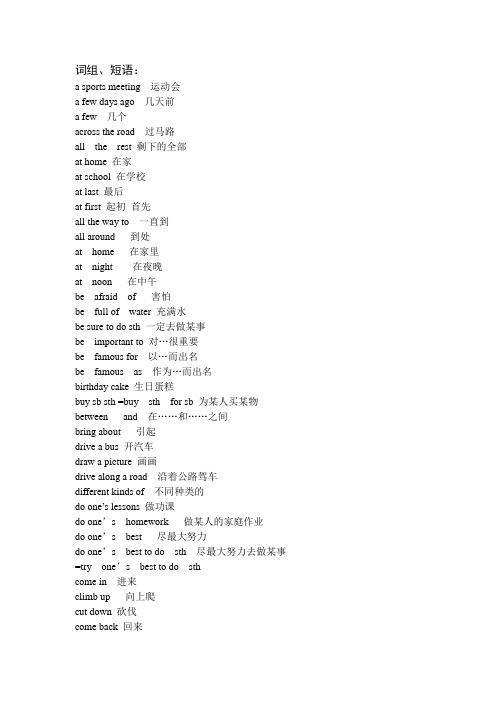
词组、短语:a sports meeting 运动会a few days ago 几天前a few 几个across the road 过马路all the rest 剩下的全部at home 在家at school 在学校at last 最后at first 起初首先all the way to 一直到all around 到处at home 在家里at night 在夜晚at noon 在中午be afraid of 害怕be full of water 充满水be sure to do sth 一定去做某事be important to 对…很重要be famous for 以…而出名be famous as 作为…而出名birthday cake 生日蛋糕buy sb sth =buy sth for sb 为某人买某物between and 在……和……之间bring about 引起drive a bus 开汽车draw a picture 画画drive along a road 沿着公路驾车different kinds of 不同种类的do one’s lessons 做功课do one’s homework 做某人的家庭作业do one’s best 尽最大努力do one’s best to do sth 尽最大努力去做某事=try one’s best to do sthcome in 进来climb up 向上爬cut down 砍伐come back 回来call sb 给某人打电话come up 过来come to an end 结束every four years 每四年have a sports meeting 举行一场运动会have a test 考试have an English test 有(进行)一场英语考试have to 不得不,只好,只得have a good time 玩得开心heavy rain 大雨hop up 向上跳hop on 在……上跳“have﹢食物﹢for﹢三餐名词”表示哪一餐吃什么In each leap year 每隔几年in the evening 在晚上this morning 今天早上tell sb about sth 告诉某人关于某事tell sb to do sth 告诉某人做某事the same age 同岁the different ages 不同岁these days这些天laugh at sb 嘲笑某人last Sunday 上个星期天Last week 上周live a better life 过好日子wait for 等待watch TV 看电视write out 写出来What’s wrong with you?=What’s the trouble with you?=What’s up ? 你怎么了?Want to do sth 想要做某事wash clothes 洗衣服walk up 走上前walk across 走路穿过walk off 离开with …on one’s back 某人背上背着••with …on one’s hand 某人手上拿着••What about you ?=How about you ?And you ? 你呢?yesterday afternoon 昨天下午far from 离••很远keep birds 养鸟see farther 看的更远sit down 坐下show sb sth =show sth to sb 给某人看某物say sorry to sb 对某人说抱歉succeed in tricking someone 成功地捉弄某人succeed in doing sth 成功做某事start to do sth 看是做某事some time 一段时间see a film 看电影play basketball 打篮球visit a friend 拜访一个朋友not any more =no more 不再try to do sth 试着做某事fly away 飞走take photos 拍照talk with sb 和某人谈话go fishing 去钓鱼go swimming 去游泳go shopping 去购物go boating 去划船go out 出去go on 继续go on(doing)sth 继续……go to the park 去公园go to town 上县城;上城里去go back 回去get down 下来get on 上(车、船等),骑上get off 下车get up 起床get ready for 为…做准备get food from 从…得到食物jump highest 跳的最高run fastest 跑的最快look for 寻找look at 看着look like 看起来像look after 照顾、look out 当心小心look up 向上看of the +基数词几者之中(of the three 三者之中)on the +序数词+floor 在第几层楼(On the fifth floor 在五楼)on one’s way 在••路上on one’s way home 在某人回家的路上(home 本身是副词不要加to) on one’s way to the school 在某人上学的路上on his way home 在他回家的路上on his way to school 在他去学校的路上on the earth 在地球上on the ground 在地面上on the farm 在农场on that day 在那一天on Sunday evening 在周日晚上other students/pupils 其他学生on Sunday 在星期日on Sundays 在每个星期日on Sunday morning 在星期日早上one of …之一(后加名词复数)not at all 一点也不不客气,不用谢in the school 在学校in your class 在你班里in the middle 在中间in red T-shirt 穿红色T恤衫的in front of 在••前面(物体外面前面)in the front of 在••前面(物体内部前面)in Class5 Grade 6 在六年级五班in teacher’s office 在老师的办公室in the world 在世界上in the sky 在天空中in a cold winter 再以个寒冷的冬天in summer 在夏天(在四季前都用介词in)in the evening 在晚上(傍晚)make a kite 做风筝make the air clean 净化空气(make +名词+形容词使…变得怎么样)fly away 飞走fly back to Canada 飞回加拿大fly a plane 开飞机fly to +地点飞往某地wash clothes 洗衣服at last 最后play a joke on sb. 和某人开玩笑laugh at 嘲笑grow up 长大take a walk 散步=go for a walk 散步walk along 沿着……走walk in snow 在雪上走Tree Planting Day 植树节keep from 阻止keep birds 养鸟flow away 流失blow up 吹起,刮起more and more 越来越多(比较级+比较级:越来越……)better and better 越来越好plant trees 种树grow rice 种水稻sing songs 唱歌begin to 开始last Sunday 上个星期日in the morning 在早上this morning 今天早上every morning 每天早上near to 离••很近far from 离••很远sit down 坐下sit on 坐在…上say sorry to sb 对某人说抱歉say good bye to sb 和某人告别say hello to sb 和某人问好tell sb to do sth. 告诉某人做某事ask sb to do sth. 叫某人做某事let sb do sth. 让某人做某事(let后面不要加to)build a big house 建一所大房子sing songs for people 为人们唱歌want to be a +职业想成为…without air 没有空气would like to do sth 想要做某事=want to do sthjoin us 加入我们summer holiday 暑假take a trip 去旅行=go for a triptake a trip around the world 周游世界visit sb 拜访某人visit sp 参观某地have a holiday 去度假the Great Wall 长城the capital of China 中国的首都a friend of his 他的一位朋友名词+ of +名词性物主代词:…的fall on 落在…上this warming of ……的升温It is + 形容词+to do sth 做某事是怎样的teach sb to do sth 教某人做某事teach student to read 教学生读stay in +地点呆在…Children’s Day 儿童节Teachers’Day 教师节National Day 国庆节Fools’Day 愚人节National Day 国庆节反身代词:myself 我自己ourselves 我们自己yourself 你自己yourselves 你们自己himself 他自己herself 她自己itself 它自己themselves 他们自己两好、两多、两坏、一老、一少、一远good(好的)/well(健康的) better bestbad (坏的)/ill(有病的) worse worstmuch/many(多的) more mostold (老的) older/elder oldest/eldest little(少的) less leastfar (远的) farther/further farthest/furthest 不规则的动词过去式:eat---ate get—gotis,am——was are——were bring——brought buy——bought begin——began call——called cut——cut come——came can——could have/has——had hop——hoppedhear——hearddo——diddrive——drovedraw——drewsit——satsee——sawsay——saidstop——stoppedstart——startedsing——sangstand——stoodswim——swamrun——ranfly——flewfind——fondtell——toldtake——tooktry——triedteach——taughtthink——thoughtgo——wentknow—knewget——gotgrow——grewmake——mademeet——metplay——playedput——putwalk——walkedlive——livedleave——leftlet——letkeep——keptwrite——wroteread/ri:d/——read/red/ wonder——wondered公式:最高级句型:(一般现在时)1、sb/sth + is + the + 最高级+ 范围(肯定句)He is the tallest boy in our class.(他是我们班最高的男孩)2、who/which +is +the+最高级+A、B or C(范围) (特殊问句)Who is the tallest boy in your class ?(在你们班谁最高?)3、sb/sth +实意(行为)动词+最高级+范围He jumps highest in our class.(他在我们班跳得最高。
科普版小学六年级英语下册1-5复习课教学提纲
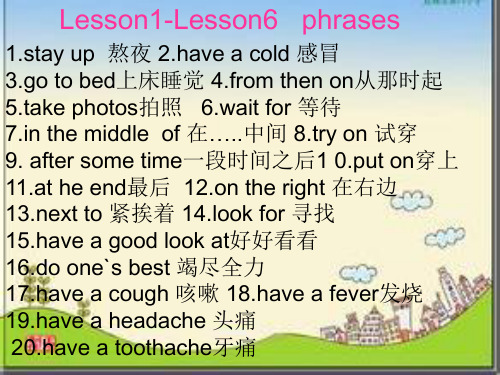
119.ask sb. to do sth. 让某人做某事 120.have to 不得不,必须121.ever after 从此 122.worry about 担心123.the Great Wall长城 124.visit a friend看望朋友 125.on the left / right在左边/右边 126.in the library 在图书馆里 127.look for 寻找128.give sth.to sb.给某人东西 129.turn left /right向左转/右转 130.an old woman一位老妇人
21.give sb..sth. 给某人东西
22.this afternoon今天下午23.on TV在电视上
24.a football game 一场足球比赛
25.stay in bed 待在床上 26.plenty of 大量的
27.in bed 在床上 28.be with me 和我在一起
st Sunday/Saturday /Friday / ….. 上 周日 周六 周五
51.Sounds great !听起来不错!52.every day 每天 53.first trip 第一次旅行 54.in the garden 在花园里 55.there is/are =there live 有(表示某处有某物) 56.many beautiful flowers 许多漂亮的花 57.like to play 喜欢玩 58.one day 一天 e back 回来 60.after a long trip 长途旅行 61.see sb. playing 看见某人正在玩 62.in his garden在他的花园里
81.go to the zoo 去动物园 82.ride a bike 骑自行车 83.take some photos拍一些照片 84.write a letter写信 85.buy some vegetables买一些蔬菜 86.play football 踢足球 87.go shopping 购物 88.in front of在 …..前面89.go out 出去 90.have a look看一看 91.with sb.on one`s back背上背着 92.sit down坐下 93.cross the road穿过公路 94.walk off 离开 95.start to go 开始开动 96.in the world在世界上97.very much 非常 98.do one`s best to protect sth. 近某人最大努里 保护什么99.by taxi乘出租车 100.a red sweater 一件红色的毛衣
六年级下册unit1知识点(K12教育文档)

六年级下册unit1知识点(word版可编辑修改)编辑整理:尊敬的读者朋友们:这里是精品文档编辑中心,本文档内容是由我和我的同事精心编辑整理后发布的,发布之前我们对文中内容进行仔细校对,但是难免会有疏漏的地方,但是任然希望(六年级下册unit1知识点(word 版可编辑修改))的内容能够给您的工作和学习带来便利。
同时也真诚的希望收到您的建议和反馈,这将是我们进步的源泉,前进的动力。
本文可编辑可修改,如果觉得对您有帮助请收藏以便随时查阅,最后祝您生活愉快业绩进步,以下为六年级下册unit1知识点(word版可编辑修改)的全部内容。
一、重点单词taller__________ shorter__________stronger__________ thinner__________older__________ younger__________bigger__________ smaller__________longer__________ heavier__________二、经典句型1.——-How tall are you? 你有多高?—--I'm 164 cm tall。
我164 厘米高。
2. You’re shorter than me。
你比我矮.3. You’re 4cm taller than me。
你比我高4厘米。
4。
-——How heavy are you?你有多重?—-—I’m 48 kg. 我48千克.5. What size are your shoes?你穿多大号的鞋?6。
Let’s have a look. 让我们看一看。
三、知识详解1. I’m the tallest。
我是最高的.That’s the tallest dinosaur in this hall. 那是这个厅里最高的恐龙.句中tallest是tall的最高级。
”sb./sth + be动词 + the + 形容词的最高级(+ 表示范围的介词短语).”这是用形容词的最高级来描述人或事物的常用句型,意为“某人/某物(在…当中)是最…的.”形容词的最高级用于三者或三者以上的人或事物进行比较,表示“…之最”,记住要在最高级前加定冠词“the”。
【教材知识点梳理】小学英语各册知识梳理-六年级下册 科普版

OK.
交际用语
What’s the matter? I’m not feeling well.
Could you give me some water, please?
Here you are.
√
一般疑问句:
Did you/he/she/you/they play football yesterday?
肯定回答:
Yes, I/he/she/we/they did.
否定回答:
No, I/he/she/we/they didn’t.
特殊疑问句:
What did you/he/she/you/they do yesterday?
√
√
√
Lesson4
What did you do last Saturday?
词汇
重点词:supermarket, taxi, sweater, cool, young, clothes
√
√
√
√
白体词:poor, dead, quickly, lose
短语:try on, put on
动词短语:see a film,make a cake,fly a kite,do my homework
一般过去时态没有人称和数的变化,其否定句和疑问句要借助助动词did。不管主语的人称和数是什么,均用did。
其肯否问答特句型变换如下:
肯定句:
I/He/She/We/They played football yesterday.
否定句:
I/He/She/We/They didn’t play football yesterday.
科普版六年级下册英语第一课第一课时Let27s talk资料讲解

in
Let’s talk.
• Eve:Look at the three runners,Who is the one in the middle?
• Ma Jun:He’s John. • Eve:Is he the tallest boy in your class? • Ma Jun:No,he isn’t. • Eve:Who is the tallest boy in your class? • Ma Jun:Liu Hai. • Eve:Who runs fastest in your class? • Ma Jun:Liu Wei runs fastest? • Eve:Which one is Liu Wei? • Ma Jun:Look! The one in the yellow T-shirt.
• 对人进行提问用who
• John is the one in the middle.
• Who is the one in the middle?
• He’s John.他是约翰。
• He’s=He is
• Is he the tallest boБайду номын сангаас in your class?他是你们 班最高的男生吗?
杜集中心学校小组自主六环节导学案
温馨提示
• 每周习惯:上课注意专心听讲,把老师讲 的重点记到笔记本或课本上。
• 课前准备:拿电子白板钥匙的同学打开电 子白板,其余同学准备好笔、课本、笔记 本、练习本并抖擞精神听课。
• 每日一言: Who runs fastest in your class?你们班 谁跑的最快?
tall /tɔːl/ 高的 反 义 词 short /ʃɔːt/ 矮的 指人,动植物等有生命的东西,主要用tall ,
科普版英语小学六年级下unit1课件

A big dam 一个大坝 A thick book 一本厚书
The biggest dam 一个大坝 The thickest book 一本厚书
形容词副词比较级、最高级构成
规则变化 1、一般情况直接在词尾 加“er”、“est” 原级 tall small 比较级 taller smaller nicer bluer bigger thinner 最高级 tallest smallest nicest bluest biggest thinnest
Heart A is biggest among the five hearts
A 在五颗心里 最大
.
在一个大集合中,共五类
李(最 高)
他在班里最高 He is tallest in the class.
张
王
赵
…
关
…
曹
…
A long structure 一个长的建 筑
The longest structure 一个长的 建筑
1.太阳、月亮、地球,哪 一个最小?月亮最小。 2.小新、曾志伟和姚明, 谁最低?小新最低。 3.刘翔是我们班跑的最快 的男生。 4.Mary是他们班跳舞跳 得最好的。 5.它是你们家最大的猫吗? 6. Lily在她家最瘦。
1.Which is the smallest, the sun, the moon or the earth? 2.Who is the shortest of the three,Xiaoxin,Zengzhi Wei or Yao Ming? Xiaoxin. 3.Liu xiang runs fastest in our class. 4.Mary dances best in their class. 5.Is it the biggest cat in your home? 6.Lily is the thinnest one in her family.
- 1、下载文档前请自行甄别文档内容的完整性,平台不提供额外的编辑、内容补充、找答案等附加服务。
- 2、"仅部分预览"的文档,不可在线预览部分如存在完整性等问题,可反馈申请退款(可完整预览的文档不适用该条件!)。
- 3、如文档侵犯您的权益,请联系客服反馈,我们会尽快为您处理(人工客服工作时间:9:00-18:30)。
最高级的句子
• Who jumps highest, Tom, Jim or Jack? (Tom, Jim Jack,谁跳得最高?)
• Jack jumps highest of the three. (Jack是他们三个人当中跳得最高的。)
请你用本课所学单词,完成下面的 字谜表
i
e
si t
描述外貌的单词
tall高的
short矮的
fat肥的
thin瘦的
old老的
young年幼的
big大的
small小的 little小的
pretty漂亮的 ugly丑陋的
strong强壮的
high与tall
tall /tɔːl/ 高的 反 义 词 short /ʃɔːt/ 矮的 指人,动植物等有生命的东西,主要用tall ,不用
• Ted is the fattest of the three. Ted是他们三个人当中最肥的。)
• Who is the oldest, Kate, Jane or Eve? (Kate, Jane, Eve,谁的年龄最大?)
• Eve is the oldest of the three. • (Eve是她们三个人当中年龄最大的。)
• Who runs fastest, Mary, Lucy or Lily? (Mary, Lucy, Lily,谁跑得最快?)
• Lily runs fastest of the three. (Lily是她们三个人当中跑得最快的。)
• Who is the fattest, Ted, Tim or Dick? (Ted, Tim, Dick,谁最肥?)
• 类型二: • 问:Who + is +the + 最高级, A, B or C? 表
示“谁是最……的”。 • 答:某人 + is + the + 最高级 +范围. 表示
“某人是最……的”。 • Who is the fattest ,Dick,Tim or Ted?
• Ted is the fattest of the three. • Who is the oldest ,Kate,Jane or Eve?
科普版六年级英语下册
第一单元复习
单词集中营
• middle /‘midl/
• shirt /ʃə:t/
• so /səu /
• first / fə:st /
Hale Waihona Puke • ear /iə/• if
/ if /
中间(的) ☆ ☆ ☆ ☆ 衬衣☆ ☆ ☆ ☆ 因此☆ ☆ ☆ ☆ 第一,首先☆ ☆ ☆ ☆ 耳朵☆ ☆ ☆ ☆ 如果☆ ☆ ☆ ☆
• want to 想,想要 • go out 出去 • look for 寻找 • go on 继续 • climb up爬上 • get down下来
• 表时间 • • 表穿戴 • • 表地点 • • 表方位 •
in 用法小结
in the morning in the year in the yellow T-shirt. in his new clothes in the class in the world in the middle in front of
high, eg: a tall woman 一个高个子妇女
a tall horse 一匹高大的马 high /hai/ adj/adv高的、高地 low /ləʊ/ adj/adv低的、低地
high 反 义 词 low adj.指建筑物、山时tall或high都可以,不过high的
程度比tall高。
adv. eg:Jack jumps highest of the three. 此句中high为程度副词,修饰动词jump
短语集中营
• in the middle
在中间
• get down
下来
• talk with和……某人说话,谈论
• in the world 在世界上
• in front of 在……前面
特殊的比较级和最高级:
原级
比较级
good well many much far
better more farther
最高级
best most farthest
• 用法技巧:当句子里出现单词 than(比什么 更……)用比较级,(二者比较)当句子里 出现单词 in ,of 时用最高级(大于等于3 者) 。
用最高级描述班里的同学
• Look! It’s our class. Lin Hai is the tallest boy in our class. Liu Wei runs fastest in our class. John is the strongest boy in our class. Lin Lin is the prettiest girl in our class. I am the youngest boy in our class.
• 看!这是我们班。林海是我们班里最高的 男孩。刘伟是我们班里跑得最快的。约翰 是我们班里最强壮的男孩。琳琳是我们班 里最漂亮的女孩。我是我们班里年龄最小 的。
语法集中营——形容词的最高级
• 特点:后缀是est.前面必须加定冠词the. • 变换规则:直、去、双、变、特 • 如: high-highest fast-fastest old-oldest • nice-nicest • fat-fattest • heavy-heaviest • many-more-most
两类易考的最高级句型
• 类型一: • 问:Who + 实义动词单三 + 最高级, A, B or C?
表示“谁做的最……的”。 • 答: 某人 +实义动词单三+ 最高级 +范围, 表
示“某人做的最……的”。 • Who jumps highest, Tom, Jim or Jack?
Jack jumps highest of the three. • Who runs fastest ,Lily,Lucy or Mary ? • Lily runs fastest of the three.
